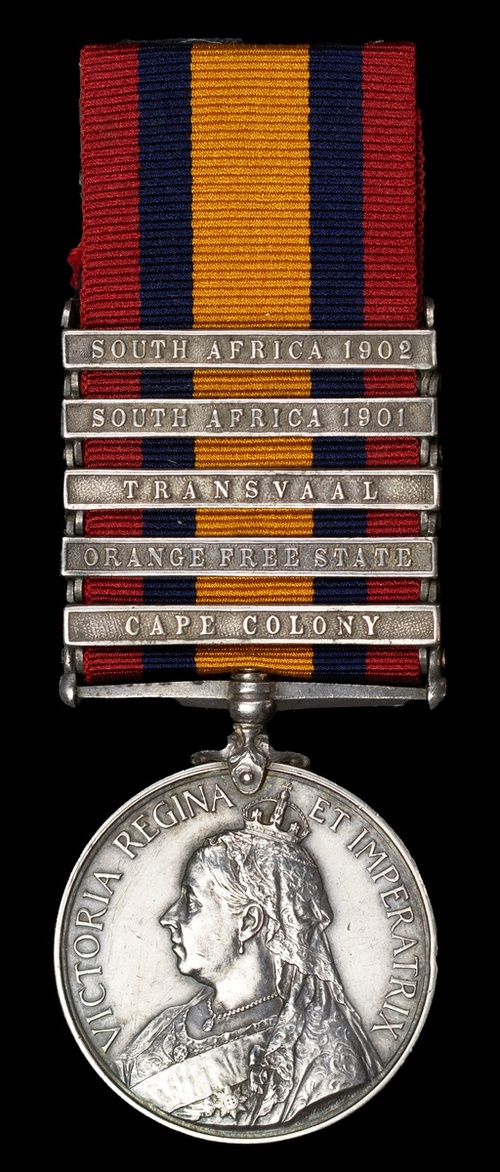
Auction: 25111 - Orders, Decorations and Medals - e-Auction
Lot: 188
The poignant Queen's South Africa Medal awarded to Major J. R. Landale, Royal Scots Fusiliers who was mortally wounded at the Battle of Dujaila Redoubt on 8 March 1916 while commanding the 2nd Queen's Own Rajput Light Infantry
Queen's South Africa 1899-1902, 5 clasps, Cape Colony, Orange Free State, Transvaal, South Africa 1901, South Africa 1902 (Lieut: J.R. Landale. Rl: Scots Fus:), very fine and better
James Russell Landale was born on 6 December 1881 at Secunderabad, India the son of Surgeon General James Landale, R.A.M.C. Educated at Cheltenham College he was accepted as a Gentleman Cadet at the Royal Military College, Sandhurst. Commissioned into the Indian Army (unattached list) as a 2nd Lieutenant on 8 January 1901, he joined the Royal Scots Fusiliers in India on 9 March1901.
Advanced to Lieutenant on 12 December 1904, he transferred to the Indian Army joining the 2nd Rajput Light Infantry on 30 September 1905. The Regiment was stationed in Bombay, India when the Great War started. They were initially sent to Egypt to defend the Suez Canal.
They took part in the defence of the Canal when Turkish forces attacked on 3-4 February 1915. They next deployed to Mesopotamia in December 1915 with Landale being advanced to Major. On 8 January 1916.
Landale was tragically killed in action at the Battle of Dujaila Redoubt on 8 March 1916 in a failed attempt to break through to the besieged British garrison at Kut. The Regiment suffered grievous losses that day with ten of its eleven British officers and fifty percent of the Regiment becoming casualties.
His Brigade Commander wrote at the time 'Major Landale has been in command of the Regiment since they arrived in Mesopotamia and that the magnificent way in which the Regiment went in to attack and fought was largely due to his leadership and fine example. He was wounded in the thigh but took no notice and went on until mortally wounded.'
'Today in World War One' describes the muddled battle, stating:
'Aylmer planned a ten-mile night march towards the main Turkish obstacle on his line of approach-the redoubt at the Dujaila depression. He hoped his troops, arriving and attacking at dawn, would have total surprise and could quickly overwhelm the Turkish defenders. However, the night march did not proceed as quickly as planned; they did not start until 10:20 PM on March 7, and there were further delays in separating support from infantry columns.
By dawn around 5:40 AM, the British Indian forces were still over two miles from the Turkish lines at Dujaila. Aylmer believed the element of surprise had been lost, and did not want to risk a two-mile attack over open ground. This was despite reports from scouts indicating that the Turkish trenches were essentially empty. Many of the Turkish defenders around Kut had been transferred north to fight the Russians in Persia or the Caucasus after the loss of Erzurum, leaving the lines at Dujaila essentially denuded.
Aylmer instead brought up his guns and began an artillery barrage at 7AM, which proceeded for the next three hours. This was the first the Turkish commander in the area, Ali Ihsan Bey, had heard of the British advance, and he quickly told his artillery and machine guns to rush to the area and "answer the enemy artillery and to fire on any enemy troops as they marched." He recalled that "The enemy did not send their infantry forward while their artillery was firing on us. We benefited from this mistake and all of our troops managed to arrive" in time.
When the infantry attacked at 10am, they now took heavy casualties from the newly arrived Turkish forces. One Turkish veteran, Abidin Ege, recalled, "The distance between us and the enemy was only 800 meters. Both sides started firing and the battle began. The enemy made every effort to reach us, but their forces were melting under the heat of our fire." A renewed attack in the afternoon briefly reached the redoubt itself but was repulsed; the British suffered nearly 3500 casualties out of his 18,000-man force. On the other side, Abidin Ege wrote that "we had an absolute victory against the enemy, yet we lost half of our battalion." The British withdrew that night in disarray.'
There are photographs of Landale in 'The Looker-on' of 18 March 1916 and in the 'Graphic' of the same date.
Extraordinarily his father, Surgeon General James Landale died on the same day as his son.
Landale has no known grave and is commemorated on the Basra Memorial. He is also commemorated on his parent's grave in Cheltenham Cemetery and Crematorium, Cheltenham, Gloucestershire; sold together with an archive of copied research.
Subject to 20% VAT on Buyer’s Premium. For more information please view Terms and Conditions for Buyers.
Sold for
£290
Starting price
£140




